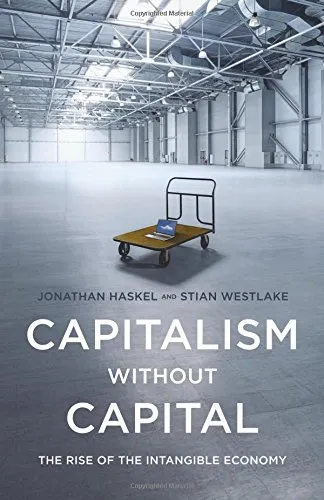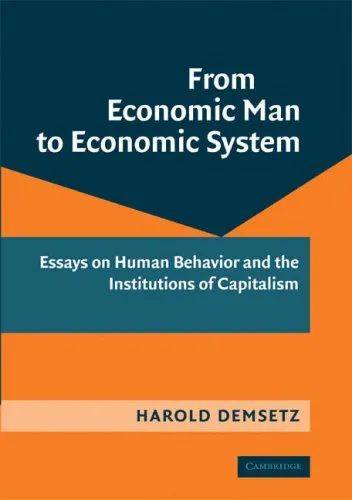Capitalism without Capital: The Rise of the Intangible Economy
4.5
بر اساس نظر کاربران

شما میتونید سوالاتتون در باره کتاب رو از هوش مصنوعیش بعد از ورود بپرسید
هر دانلود یا پرسش از هوش مصنوعی 2 امتیاز لازم دارد، برای بدست آوردن امتیاز رایگان، به صفحه ی راهنمای امتیازات سر بزنید و یک سری کار ارزشمند انجام بدینکتاب های مرتبط:
معرفی کتاب "سرمایهداری بدون سرمایه: طلوع اقتصاد ناملموس"
کتاب "Capitalism without Capital: The Rise of the Intangible Economy" نوشته جاناتان هسکل و استیان وستلیک، یکی از آثار برجستهای است که موضوعی کاملاً نوآورانه را در دنیای اقتصاد مورد بررسی قرار میدهد. این کتاب به ما نشان میدهد که چگونه داراییهای ناملموس یا Intangible Assets بهتدریج جای داراییهای ملموس همچون ماشینآلات و ساختمانها را در اقتصاد جهانی گرفتهاند و چگونه این تحول عمیق، قوانین و اصول سنتی اقتصاد را دگرگون کرده است. در ادامه به بخشهای مهم این کتاب و دلایل اهمیت آن پرداخته خواهد شد.
خلاصهای از کتاب
در گذشته، سرمایهگذاری در داراییهای ملموس همچون تجهیزات، املاک، و زیرساختها نماد اصلی یک اقتصاد پیشرفته محسوب میشد. اما در دهههای اخیر، سرمایهگذاری در داراییهای ناملموسی مانند تحقیق و توسعه، نرمافزار، برندینگ، و سرمایه انسانی بهطور چشمگیری رشد کرده است. کتاب "Capitalism without Capital" با تحلیل این تحولات، نشان میدهد که چگونه انقلاب ناملموس باعث شده تا اقتصاد مدرن بر داراییهایی که ناملموس هستند پایهریزی شود.
نویسندگان با اشاره به ویژگیهای خاص داراییهای ناملموس از قبیل مقیاسپذیری فزاینده، قابلیت همافزایی، و حاشیههای هزینهای کم، استدلال میکنند که این ویژگیها نهتنها فرصتهای جدیدی را برای رشد اقتصادی فراهم کردهاند، بلکه چالشهایی همچون افزایش نابرابری و مشکلات در تأمین مالی زیرساختها را نیز به همراه داشتهاند. هسکل و وستلیک همچنین توضیح میدهند که چطور دولتها، سرمایهگذاران، و کارآفرینان میتوانند با این تغییرات سازگار شوند.
نکات کلیدی کتاب
- افزایش چشمگیر اهمیت Intangible Assets در اقتصادهای پیشرفته و نوظهور.
- تأثیر داراییهای ناملموس بر ایجاد رشد اقتصادی و بهرهوری.
- چهار ویژگی اصلی داراییهای ناملموس: مقیاسپذیری (Scalability)، اثرات جانبی مثبت (Spillovers)، میانرشتهای بودن (Synergies)، و دشواری در تأمین مالی.
- تحلیل مشکلات نظامهای حسابداری و مالی سنتی در ثبت و ارزشگذاری داراییهای ناملموس.
- راهکارهایی برای سیاستگذاران و سرمایهگذاران برای حرکت به سوی اقتصاد ناملموس.
نقلقولهای معروف
"The most important transformative trend in modern economies is the shift from tangible to intangible investment."
"The shift to intangible investment has profound implications – from the way businesses compete to the way that economies shape their policies."
"In a world dominated by intangibles, ideas and knowledge grow in importance as drivers of economic value."
چرا این کتاب مهم است؟
کتاب "Capitalism without Capital" بهخوبی تحولاتی را تشریح میکند که نهتنها بر اقتصاد، بلکه بر جنبههای اجتماعی و سیاسی نیز تأثیر گذاشتهاند. این کتاب به ما میآموزد که چگونه بتوانیم خود را با تغییرات در ساختار اقتصادی تطبیق دهیم و از فرصتهای این تغییرات بهرهبرداری کنیم. اهمیت این اثر برای سیاستگذاران، دانشجویان اقتصاد، و کسانی که در صنایع پیشرفته فعالیت میکنند، انکارناپذیر است.
این کتاب همچنین برای هرکسی که میخواهد دنیای اقتصاد مدرن را بهتر درک کند، خواندنی ضروری است. از مسائل مرتبط با Financing Intangible Assets تا تأثیر تحولات ناملموس در تفاوتهای منطقهای و تبعیض گوناگون، کتاب به تمام این جنبهها نگاه جامع و عمیقی دارد. به همین دلیل، این اثر یکی از منابع کلیدی در بحث اقتصاد مدرن و همچنین چشمانداز آینده جهانی است.
Introduction to "Capitalism without Capital: The Rise of the Intangible Economy"
Written by Jonathan Haskel and Stian Westlake, "Capitalism without Capital" is an insightful exploration of one of the most profound shifts in global economics today: the rise of intangible assets and their transformative impact on the economy, businesses, and society. In this book, Haskel and Westlake take readers on a journey to understand how economies reliant on physical assets have evolved into economies driven by intangible investments like software, branding, research, and organizational development.
Drawing from comprehensive research and real-world examples, the book explains the fundamental characteristics that make intangible assets unique and why they have changed the way businesses operate. "Capitalism without Capital" is essential reading for anyone looking to understand the economic forces shaping the modern world, from policymakers and entrepreneurs to academics and curious readers.
The book's primary aim is to illuminate how this shift has created new challenges and opportunities, altered competitive dynamics, and changed the ways organizations create value. With its clear storytelling and rigorous analysis, it unlocks critical insights for navigating this new economic paradigm.
Detailed Summary of the Book
At its core, "Capitalism without Capital" explains how the economic center of gravity has shifted away from tangible investments like factories, machinery, and other physical goods to intangible assets, which are harder to see or touch but incredibly valuable.
Haskel and Westlake outline the unique characteristics of intangible investments, which they call the “four Ss”: scalability, sunk costs, spillovers, and synergies. These features make investing in intangibles dramatically different from traditional physical assets. For instance, intangible assets are scalable, meaning that an investment in software or intellectual property can be used repeatedly at little additional cost. However, they also involve sunk costs since their value cannot usually be recovered upon resale.
The authors go further to illustrate how the intangible economy creates challenges, such as the difficulty of financing intangible investments, inequality in access to intangible-driven growth, and the "Matthew Effect," where success begets success. But they also highlight its potential for generating enormous returns through synergies, where different intangible assets work together to create new value.
Real examples—ranging from high-tech companies to traditional businesses leveraging intellectual property—are provided to ground these concepts. By the end of the book, readers gain a comprehensive understanding of why nations, corporations, and individuals must adapt to thrive in a world where capitalism is increasingly defined by intangibles.
Key Takeaways
- The world's leading economies have transitioned from being based on physical goods to intangible assets such as intellectual property, software, and branding.
- Intangible investments differ fundamentally from tangible ones due to their unique scalability and sunk costs, as well as their propensity to spill over and synchronize with other assets.
- While intangible-driven economies generate high growth potential, they also create challenges, such as economic inequality, barriers to financing, and the risk of monopolies formed through synergy and spillover effects.
- To succeed in the intangible economy, businesses and policymakers must rethink institutions, from tax systems to education and employment policies, to better accommodate and leverage intangibles.
- The shift to intangibles intensifies the divide between those who can capitalize on this new form of capital and those left behind, raising pressing ethical and policy concerns.
Famous Quotes from the Book
“When you look at the most successful companies and economies, you will be struck by how much they invest in things that have no physical form, like computer software, ideas, brands, or business processes.”
“Success in the intangible economy depends on your ability to manage synergies, know-how, and ideas, rather than just land, labor, and capital.”
Why This Book Matters
"Capitalism without Capital" offers an indispensable framework for understanding the 21st-century economy and its profound social and economic implications. It challenges traditional views of economic growth and makes it clear why businesses and governments need to realign their strategies in light of these transformative changes. By shedding light on the dynamics of an intangible-driven world, the book equips readers with the knowledge they need to navigate the future effectively.
Policies, business strategies, and educational systems built around tangible concepts of production and investment are no longer enough. The rise of intangible capital demands new ways of thinking and acting. This book provides not just a diagnosis of the current state but also a vision for how we can thrive in the emerging economic landscape.
دانلود رایگان مستقیم
شما میتونید سوالاتتون در باره کتاب رو از هوش مصنوعیش بعد از ورود بپرسید
دسترسی به کتابها از طریق پلتفرمهای قانونی و کتابخانههای عمومی نه تنها از حقوق نویسندگان و ناشران حمایت میکند، بلکه به پایداری فرهنگ کتابخوانی نیز کمک میرساند. پیش از دانلود، لحظهای به بررسی این گزینهها فکر کنید.
این کتاب رو در پلتفرم های دیگه ببینید
WorldCat به شما کمک میکنه تا کتاب ها رو در کتابخانه های سراسر دنیا پیدا کنید
امتیازها، نظرات تخصصی و صحبت ها درباره کتاب را در Goodreads ببینید
کتابهای کمیاب یا دست دوم را در AbeBooks پیدا کنید و بخرید
1266
بازدید4.5
امتیاز50
نظر98%
رضایتنظرات:
4.5
بر اساس 0 نظر کاربران
"کیفیت چاپ عالی بود، خیلی راضیام"
Questions & Answers
Ask questions about this book or help others by answering
No questions yet. Be the first to ask!



